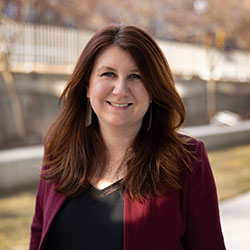
You currently serve many roles: Associate Director for Education and Director of CHEAR Fellowship programs. You're also an Assistant Professor in the Department of Pediatrics and Department of Epidemiology. How did you get to this position in your career?
I completed my undergrad, master’s degree, Ph.D., and post-doc all at the University of Michigan. Although I am now faculty in the CHEAR Center, I began working at CHEAR as a research assistant almost 15 years ago. While I was working on my Ph.D., I was studying the receipt of preventative services among children with sickle cell disease. I quickly learned the importance of the work surrounding children with sickle cell disease, and have been dedicated to the work ever since.
What is your research focused on?
My research is focused on sickle cell disease, a genetic, rare, chronic blood disorder. Sickle cell disease essentially makes the blood not flow properly through the body. It impacts the entire body - causing pain crises and even strokes. It also makes kids susceptible to infections.
There are lots of systemic problems surrounding sickle cell disease and children with the disorder. In the United States, sickle cell primarily impacts underserved and underrepresented racial and minority groups. Children with sickle cell disease already face lots of challenges. Resources for support might not be as available to them as families face discrimination both inside and outside of the healthcare system. Through my research, I want to make sure that these children have the best access to healthcare to get their needs met so that they can live their highest quality of life.
The first part of my research is focused on understanding the receipt of preventative services among kids.
Children with sickle cell disease are 300 times more likely to experience a stroke than their peers. We have an ultrasound screening that can measure the blood in the brain and help predict who is at risk for stroke. However, only one 1 in 3 kids get these screenings. It’s scary.
Since the 80s, children with sickle cell disease have been recommended to receive penicillin antibiotics for the first 5 years of life. But only 1 out of 10 children get enough antibiotics to cover a year.
A lot of my research is focused on reporting whether children are getting their preventative services, and working to improve this. Currently, we are conducting qualitative interviews with providers, patients, and their family members to try and understand where we can intervene systematically to improve opportunities for them.
There’s still a lot we don’t know a lot about sickle cell disease. Compared to other genetic diseases, our research and funding of research are decades behind.
Two years ago, we joined a cooperative agreement with the Michigan Department of Health and Human Services (MDHHS), the CDC, and 10 other states across the country. This project, the Michigan Sickle Cell Data Collection program(MiSCDC), is funded by the CDC and allows us to use multiple sources of data to understand who is living with sickle cell in our state, where they are located, and what their healthcare utilization looks like over time so we can intervene and improve their quality of life.
We are constantly updating the data and sharing it with the CDC and other stakeholders. Because of this, we’ve been able to answer questions about people with sickle cell disease in Michigan, like their vaccination rates, and hospitalizations from COVID-19.
Describe your day-to-day in your lab/research.
I have a team of research staff that spends a lot of time focused on the data and how we use and interpret it. I do a lot of writing, editing, and meetings. These meetings are often with collaborators such as our partners at the CDC, other states in the Sickle Cell Data Collection program, or the Michigan Department of Health and Human Services. We use these meetings to strategize on topics such as data standardization and peer-reviewed papers, as well as ways to disseminate our findings to stakeholders in the sickle cell disease community using infographics, social media, and policy briefs. My team has written 9 abstracts in the last month. I’m always thinking about our next grant opportunities. We want to keep moving our research ahead.
What do you hope to accomplish? Why is your work so important?
At the end of the day, I hope our research improves the lives of those with sickle cell disease. If our data can inform a policy at the state or federal level, then I’m happy to be part of it. I hope that Michigan Medicine can be a catalyst for improvements across the country.
What else should we know about your role/interests?
My research is unique in the department, due to my involvement with the MDHHS. It’s rewarding to be able to work with state-level policy-makers and staff who implement these programs.
In addition to my research, I serve as a mentor to my team. I want to make sure our team members are getting the experience they want. I am the Associate Director of Education in the CHEAR Center as well as the Director of our fellowship program. In this role, I am focused on increasing diversity among our trainees.
In your opinion, what makes the Department of Pediatrics an ideal place to work?
That’s a great question! I love the CHEAR Center, our director, Dr. Lisa Prosser, is a fantastic mentor and researcher. Our department does a great job of supporting female faculty. I work with so many brilliant, supportive, and smart leaders. We have the best examples of women in leadership.
What else do you like to do outside of work?
I have 6-year-old twins that keep me busy. Before I had twins, my husband and I owned a photography business. It’s still a big hobby of mine. I love to be outside and love to read.

About Sarah Reeves, Ph.D., M.P.H.
Associate Director for Education, CHEAR
Assistant Professor, Department of Pediatrics
Assistant Professor, Department of Epidemiology
Director, CHEAR Fellowship Programs
Dr. Reeves' research is focused on identifying opportunities to improve the health of those living with sickle cell disease. She currently is the PI of the Michigan Sickle Cell Data Collection (MiSCDC) Program, a cooperative agreement with the CDC. The objective of MiSCDC is to implement a statewide sickle cell disease surveillance system. Her R01 (funded by AHRQ) uses machine learning and mixed methods to shed light on mechanisms related to receipt of preventive services among children with sickle cell anemia. She is the steward of three NQF-endorsed quality measures for recommended preventive care among children with sickle cell disease: receipt of transcranial Doppler screening, appropriate antibiotic prophylaxis, and use of hydroxyurea therapy. Dr. Reeves holds a joint appointment in the Department of Epidemiology at the School of Public Health.



